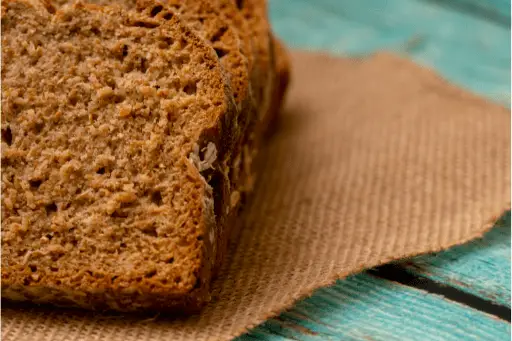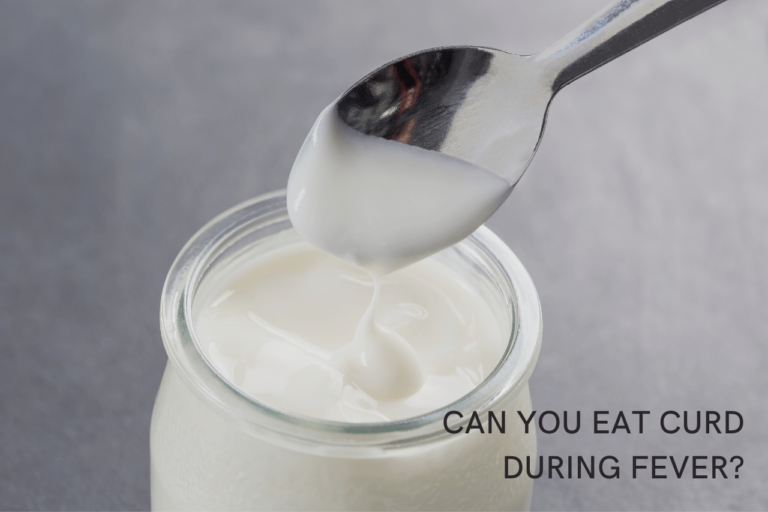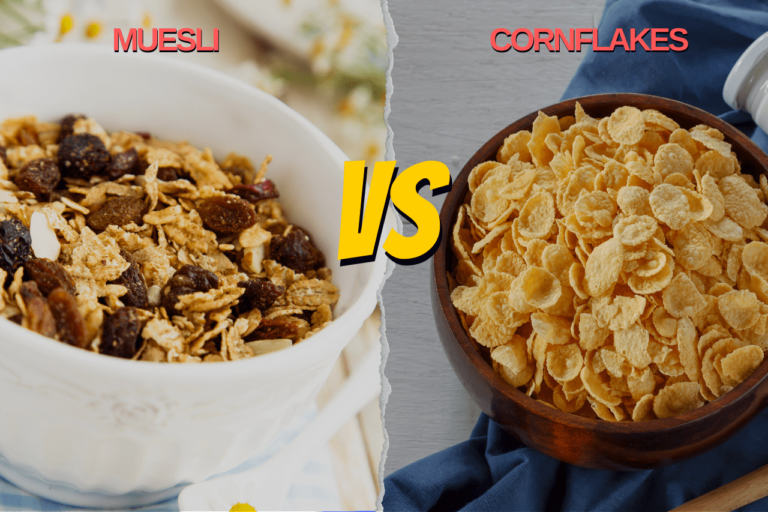Brown bread is the most popular variety of bread and is eaten by people all over the world. It is typically made from whole grains and has a crunchy crust. However, it is not as popular as the regular white bread that we all know and love.
Also, brown bread might seem like an ordinary, boring bread as it has no added flavors or colors and is often seen as dry and tasteless food.
But what people don’t know is that brown bread is full of many health benefits, and if you eat it regularly, you can reap all those benefits and more.
In this post, I will be sharing 9 benefits of brown bread that will compel you to include it in your daily diet.
Also read: Which One Is Better? A Comparison Of Brown Bread Vs White Bread
What is brown bread made up of?
Brown bread is sometimes referred to as whole grain bread, but it is not made entirely of whole grains.
It’s made of white flour, wheat, rye, barley, and any other cereal grains (or parts of cereal grains, such as the germ) that have been milled into flour, mixed with water, and baked.
The color of brown bread comes from the presence of substances called polyphenols and phytochemicals, which are mainly found in plant foods like berries, tea, chocolate, and coffee. Also, these substances are strong antioxidants, which means they can help prevent free radicals from causing damage.
Nutrition value of brown bread

Nutritional value is the measure of how good a food is for the body. It tells us how much energy, protein, fat, carbohydrates or vitamins are in a food.
Brown bread is rich in fiber, providing a nutritional value beyond just a basic carbohydrate.
With just one serving of brown bread (approximately 29g), you can get-
- 3 percent of daily calories intake.
- 1 percent of daily potassium intake.
- 4 percent of daily fiber intake.
- 5 and 7 percent of daily fiber intake for average sedentary men and women respectively.
Here is the complete nutrition value of brown bread:
| Nutrients | Quantity(29g) |
|---|---|
| Calories | 77 |
| Fat | 0.9g |
| Carbohydrate | 14g |
| Cholesterol | 0mg |
| Sodium | 147mg |
| Potassium | 51mg |
| Protein | 3.1g |
| Calcium | 47mg |
| Iron | 0.9mg |
Note that the nutrition value of brown bread can vary brand to brand. Be a label reader and always choose what suits you.
9 Health Benefits of Brown Bread

1. Good source of fiber
Fiber is one of the essential nutrients for bodies to function properly. Eating a fiber-rich, well-balanced diet helps keep bowels healthy, reduces the risk of colon cancer, lowers cholesterol, and keeps blood sugar levels in check.
The body requires about 25 to 30 grams of fiber per day.
Brown bread is a good source of fiber, providing about 15% of your daily fiber needs if you eat 100 grams per day, which is roughly three to four brown bread.
2. Excellent source of antioxidants
Brown bread is excellent source of antioxidants like vitamin C, E, cartenoids, phenolic acids and flavonoids.
According to recent studies, consumption of whole grains and grain-based products like brown bread has been linked to a lower risk of chronic diseases like cardiovascular disease, type 2 diabetes, and obesity.
3. Reduce your chances of developing type 2 diabetes
Type 2 diabetes is a condition in which the body cannot produce enough insulin to maintain a normal blood glucose level. When blood glucose levels are high, it can cause damage to the body’s organs.
According to studies, eating atleast 2 servings of products made from whole grains may help reduce type 2 diabetes risk.
It was discovered that the fiber, nutrients, and phytochemicals present in whole grains might help with insulin sensitivity and glucose metabolism, as well as slowing food absorption and preventing blood sugar spikes.
4. Reduces the risk of cardiovascular disease
Cardiovascular disease is one of the leading causes of death in the world. According to statistics, one person dies from cardiovascular disease every 36 seconds in the United States.
A study done at Harvard showed that people who ate 2.5 or more servings of whole-grain foods per day were 21% less likely to die from cardiovascular disease like heart attack and stroke than those who ate less than 2 servings per week.
5. Beneficial to digestive health
Digestion is an important part of overall health because it is linked to many systems and processes in the body.
If your digestive health is not good, it’s not just your body that is affected – your mind is too.
Brown bread is usually high in fiber, which aids in the maintenance of a healthy digestive system. It keeps waste moving through your intestines and prevents constipation by bulking up your stools.
Moreover, fiber also acts as a natural laxative, allowing food to move more quickly through the intestines.
This helps prevent diarrhea and other gastrointestinal problems.
6. Good amount of protein
It’s difficult to gain muscle and lose fat when your body isn’t getting enough protein.
On average, a sedentary man or woman should consume 56 grams of protein per day. The amount of recommended protein intake you need to consume may change if you’re performing an energy-intensive task.
Consuming 100 grams of brown bread per day (roughly 3 to 4 pieces of bread) can meet 23% of your daily protein needs, which is a significant amount.
That’s why the majority of bodybuilders and athletes eat brown bread for breakfast.
7. Good source of carbohydrates
Carbohydrates are frequently portrayed as a harmful component of a poor diet, but they are a vital source of energy for the body.
They are one of three macronutrients required for good health, along with protein and fat.
Please note that the type of carbohydrate in the diet is more important than the amount of carbohydrate in the diet.
Whole grain products such as rye, barley, and brown bread are full of good carbohydrates.
A 100gm (3–4 bread) serving of brown bread can provide you with about 20% of your daily carbohydrate needs.
8. It helps in weight management
Fiber-rich foods, such as brown bread, can help you feel fuller faster, reducing your desire for unhealthy snacks in between meals.
It can help slow down the rate at which sugar is absorbed into the bloodstream, preventing blood sugar spikes after meals, leading to overeating.
However, brown bread does not have any magical property that will help you shed pounds, but it does help in maintaining a healthy weight due to the presence of fiber and protein.
If you’re trying to lose weight, brown bread is a great option.
However, you should be aware that solely eating brown bread will not assist you in losing weight. To lose weight, you must eat well and exercise regularly.
9. It contains a lot of vitamins
Vitamins are essential nutrients for human health which human body cannot produce.
Therefore, they must be obtained through diet. The deficiency of vitamins in the body can cause blindness, cancer, dementia, and even death.
Brown bread is high in vitamins A, E, and K, all of which are required for your body to perform daily tasks.
Is brown bread better than the white bread?

Bread is one of the most popular foods for everyone, and its wide variety offers users a variety of options.
Some people prefer white bread, while others prefer brown bread, but which is healthier?
The answer is brown bread.
Brown bread differs from white bread not only in appearance but also in nutrients.
Here are some of the reasons why brown bread is a healthier option than white bread.
- It contains more fiber than white bread.
- Brown bread is made with natural grains, organic flour, sugar, salt, and yeast. On the other hand, white bread is made with refined flour, which has been linked to health problems.
- Brown bread has a lower glycemic index (GI) than white bread, which means it takes the body longer to digest, keeping us fuller for longer.
- Its protein content is higher than that of white bread.
However, in the case of calcium, white bread has more of it than brown bread.
How to choose good bread?

With so many bread options, how do you know if you’re getting something that’s actually worth eating?
Here are some tips to help you choose your bread:
- Check the packaging or production date, which is usually printed on the package.
- Go with fresh bread as it is always better than bread that has been sitting on the store shelf for a while.
- It is safe to eat bread that has been stored in the refrigerator. However, if they are older than two days, it is best not to use them.
- Check the package label to make sure the bread doesn’t have any added sugar or sugar substitutes like sucrose, glucose, or fructose. Also, check for ingredients like corn syrup, cane juice and honey.
- Choose bread that contains fewer preservatives.
- Some bread brands are high in sodium, which is bad for your health if you eat a lot of it. Look for bread with less than 150 mg of sodium per serving.
- If possible, choose bread made with sprouted grains. When a grain is sprouted, its nutrients become more easily digestible and accessible to the body. It can also add more protein, fiber, folate, and other nutrients to your diet.
Are there any side effects of brown bread?
Brown bread is healthy for most people, but it is better for some people to avoid it.
People with celiac disease or a gluten allergy should avoid brown bread as some of them contains gluten that can cause intestinal damage.
Brown bread should be avoided by people with IRB (irritable bowel syndrome), as it may contain fructans, which can cause unwanted side effects.
Final words
Even though brown bread isn’t as popular, many people still prefer it over white bread because it’s healthier and more nutritious.
It’s always a good idea to double-check whether the bread you’re eating is fresh, low in sodium and preservatives.
I hope this post has informed you on the benefits of brown bread and convinced you to include it in your diet.
References:




